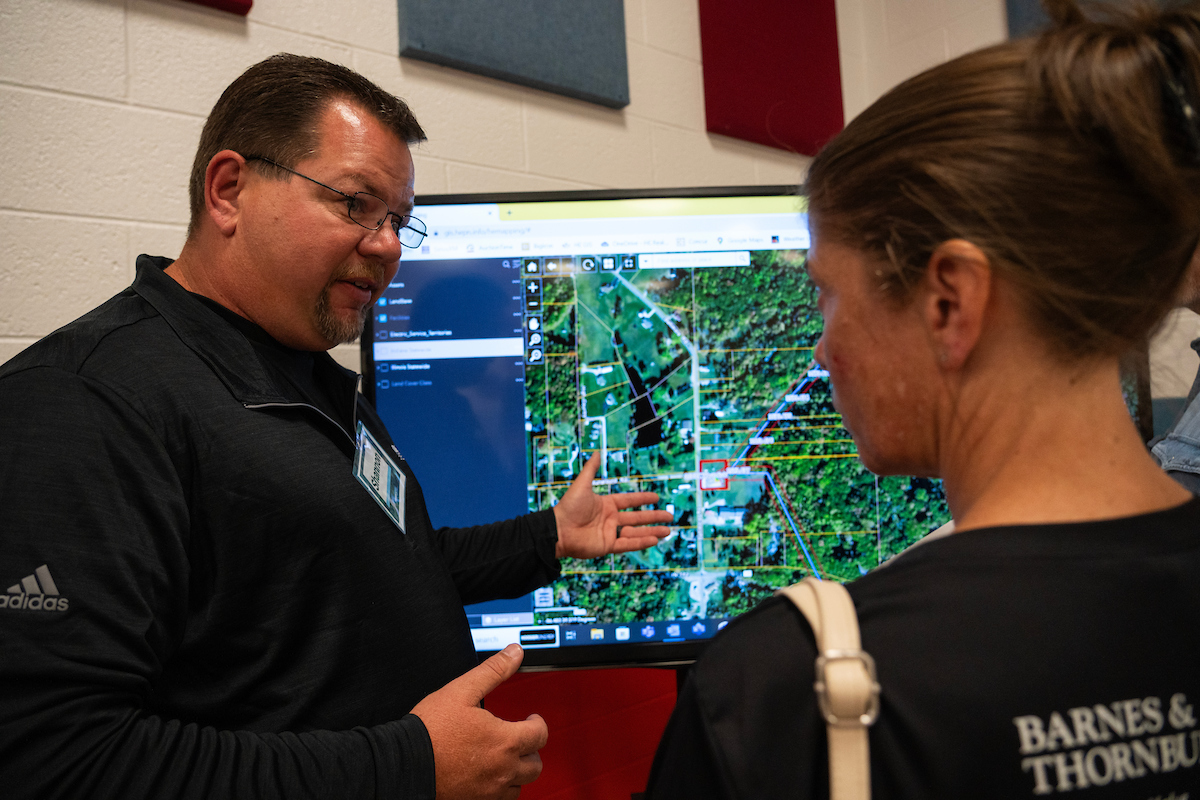In the utility industry, it’s reasonable to expect the unexpected.
When Hoosier Energy threw open the doors at Centerton Elementary School on June 23rd and 24th for the Centerton to Wilbur Project Open House, no one was sure what to expect.
“If we’ve done an open house in the past, it wasn’t done like this one, and it was so long ago that nobody remembers it,” said Real Estate Specialist and 18-year Hoosier Energy veteran Shannon Morrison.
The event featured a sign-in station and a sequence of exhibits around the cafeteria – routing analysis, engineering design, transmission line location, vegetation management and restoration.
All are key aspects of the reliability project that will include constructing 5.8 miles of new 69kV overhead transmission line to connect the Hoosier Energy Wilbur substation to the Duke Energy Centerton substation, both in Morgan County.
Senior Project Manager Amanda Sheehe briefed the Hoosier Energy and South Central Indiana REMC employees in attendance ahead of time on safety and security, not knowing if 10 people or 100 people would attend and whether they would come to talk or come bearing pitchforks and torches.
As it turned out, nearly 70 people attended – 49% of the total number that received a letter of invitation – exceeding expectations.
“From my past experience, open house attendance has been less than 10%, maybe even down to 5% at some,” Sheehe said. “I was shocked that we got almost half. It was way more than I expected. Even our consultant on the project, Burns and McDonnell, said the same thing. They have people that specialize in public engagement and less than 10% usually attend.
“Social media and things have grown so much, that probably pushed our numbers up. It’s good to know we should account for extras.”
The reaction of the attendees varied. Some went away relieved, some peeved and many of those who attended Friday night brought back neighbors on Saturday.
“Everyone walked away informed,” Morrison said. “They weren’t guessing or assuming. Some people walked away very relieved that it wasn’t on their property at all, or it was going along a route that wasn’t going to be near an area of their property that they were concerned about.
“For some people, it was their worst fear. That’s how they described it: ‘This is our worst fear. You’ve ruined our day. This is the worst news I could’ve gotten,’ which is an understandable emotional response.”
Morrison was the recipient of many of those emotional responses as his corner of the room – a large TV monitor that displayed a view from Google Earth with geographic information system (GIS) data overlayed to display the route of the project – was easily the most popular spot.

Shannon Morrison shows a member consumer a monitor with the path of the Centerton to Wilbur project.
“Being the most popular guy in the room isn’t always a good thing,” he joked, “but it was fine. I enjoy meeting with the property owners and working out our differences and learning about the challenges we’re going to have.
“When we go out to talk to property owners, we learn a lot that we don’t know ahead of time. They give us local knowledge and information about the property.”
If Morrison was popular on Friday night, he was an even bigger draw on Saturday, pulling into the Centerton Elementary parking lot to a line at the door 40 minutes before the event was set to start.
“I was on the phone with my wife, and I said, ‘There are people here right now. I’ve got to go,’” he said. “I grabbed my laptop, and they were ready. We had a lot of really good questions. People are concerned. It’s their property, and it kind of feels like an invasion of privacy. I understand their concerns.”
Those concerns were also shared at other stations, whether it was with Sheehe at the routing analysis table, Tim Emmel and Tommy Robertsat engineering, Jared Murphy at vegetation management, Dave Appel on environmental restoration or any other number of Hoosier Energy employees on hand.
“There were a lot of questions, and some people started off a little irritated,” Sheehe said. “Once they talked through it, they seemed to understand better and progressed through the different stations.
“I did get to meet some nice, interesting neighbors and get their feedback. I’ve already got a list of lessons learned from this event and this project, even though we’re still a year or more out from beginning construction on this project.”
Those lessons will pay off down the road, making for just a little less of the unexpected in future open houses.
“We will be doing more of these in the future as not only the possibility of new line construction happens, but we have several rebuilds planned out in the next several years impacting property owners,” Morrison said. “This was kind of the first step, but it wasn’t a baby step, to doing that.”